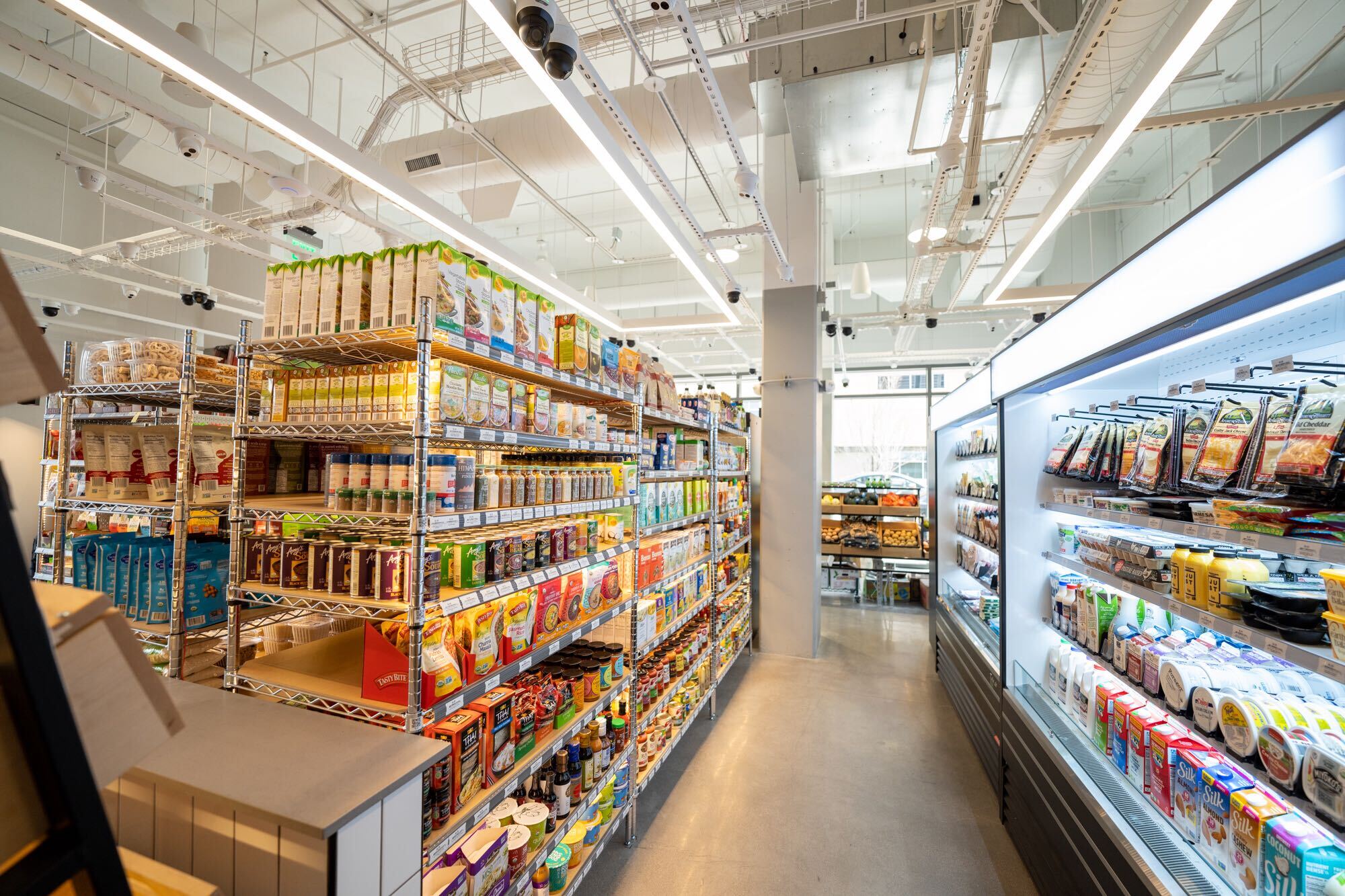
Choice Market opened its largest location, in the Golden Triangle, in 2021. (Courtesy Choice Market)
Five months after going bankrupt, Choice Market is shutting down for good.
“We really put our best foot forward and felt like we did a lot for the Denver community, for our employees, for our local suppliers, and really helped rethink this convenience format,” CEO Mike Fogarty told BusinessDen by phone Monday. “Hopefully that inspired our broader industry to really think about how this business can be done a little bit differently.”
“It’s certainly a tough day,” he added, “but I’m just grateful for all the support from our investors, our local community, our suppliers. Hopefully we can work together in the future.”
Fogarty started the company in 2017 as a grocer combined with a fast-casual restaurant. From its first location at 1770 N. Broadway, the company added four more stores and planned to open a sixth in RiNo. But that sixth location never opened due to changes in the economy.
“After the initial wave of lockdowns and restrictions eased, the Choice stores were plagued by the rising costs of goods and labor as inflation drove prices up during a crucial time when the Choice stores were attempting to rebuild,” it wrote in a bankruptcy filing last month.

Mike Fogarty
The company closed stores, cut back on marketing, used new technologies to reduce staff, and implemented purchasing controls to reduce shrinkage. By January 2024, things were looking up and an equity investor agreed to hand over $1.5 million, Choice said. But when that investment fell through, and others did as well, Choice filed for bankruptcy in early May.
“We have a lot of faith that we will navigate through this period and come out the other side a stronger company with a lot of growth prospects,” Fogarty told BusinessDen then.
There were only two Choice markets by that time: the initial Uptown location and a second in Golden Triangle. Both closed in the months that followed. Choice again needed cash.
“(Choice) intends to maintain their small footprint stores and expand on a network of ‘mini-mart’ style stores…funded by a loan,” the company wrote in a Sept. 9 court document.
That loan also fell through and the bankruptcy case took a turn, ending the company’s run.
“We put forth a plan for reorganization and one of the creditors filed a motion to be listed as a secured creditor. So, essentially, that changed the plan or would have required us to adjust the plan and prioritize their debt. Unfortunately, that couldn’t work with the reorganization,” Fogarty said this week. “So, that’s the primary reason. That was the impetus here.”
During the bankruptcy case, Choice transferred its real estate at 2200 E. Colfax Ave. — the site of a closed store — to its business partner, St. Charles Town Co. That Denver real estate firm has been listing the property for sale with a $3.6 million asking price since April.
For Fogarty, this week’s announcement brings a seven-year-long experiment to an end.
“Innovation isn’t easy, right? Especially in this environment that we’ve operated in for the past seven years, including the pandemic, inflation, record-high theft,” he said.
“I wouldn’t wish it upon any entrepreneur. It has been a wild ride, but I wouldn’t take it back.”

Choice Market opened its largest location, in the Golden Triangle, in 2021. (Courtesy Choice Market)
Five months after going bankrupt, Choice Market is shutting down for good.
“We really put our best foot forward and felt like we did a lot for the Denver community, for our employees, for our local suppliers, and really helped rethink this convenience format,” CEO Mike Fogarty told BusinessDen by phone Monday. “Hopefully that inspired our broader industry to really think about how this business can be done a little bit differently.”
“It’s certainly a tough day,” he added, “but I’m just grateful for all the support from our investors, our local community, our suppliers. Hopefully we can work together in the future.”
Fogarty started the company in 2017 as a grocer combined with a fast-casual restaurant. From its first location at 1770 N. Broadway, the company added four more stores and planned to open a sixth in RiNo. But that sixth location never opened due to changes in the economy.
“After the initial wave of lockdowns and restrictions eased, the Choice stores were plagued by the rising costs of goods and labor as inflation drove prices up during a crucial time when the Choice stores were attempting to rebuild,” it wrote in a bankruptcy filing last month.

Mike Fogarty
The company closed stores, cut back on marketing, used new technologies to reduce staff, and implemented purchasing controls to reduce shrinkage. By January 2024, things were looking up and an equity investor agreed to hand over $1.5 million, Choice said. But when that investment fell through, and others did as well, Choice filed for bankruptcy in early May.
“We have a lot of faith that we will navigate through this period and come out the other side a stronger company with a lot of growth prospects,” Fogarty told BusinessDen then.
There were only two Choice markets by that time: the initial Uptown location and a second in Golden Triangle. Both closed in the months that followed. Choice again needed cash.
“(Choice) intends to maintain their small footprint stores and expand on a network of ‘mini-mart’ style stores…funded by a loan,” the company wrote in a Sept. 9 court document.
That loan also fell through and the bankruptcy case took a turn, ending the company’s run.
“We put forth a plan for reorganization and one of the creditors filed a motion to be listed as a secured creditor. So, essentially, that changed the plan or would have required us to adjust the plan and prioritize their debt. Unfortunately, that couldn’t work with the reorganization,” Fogarty said this week. “So, that’s the primary reason. That was the impetus here.”
During the bankruptcy case, Choice transferred its real estate at 2200 E. Colfax Ave. — the site of a closed store — to its business partner, St. Charles Town Co. That Denver real estate firm has been listing the property for sale with a $3.6 million asking price since April.
For Fogarty, this week’s announcement brings a seven-year-long experiment to an end.
“Innovation isn’t easy, right? Especially in this environment that we’ve operated in for the past seven years, including the pandemic, inflation, record-high theft,” he said.
“I wouldn’t wish it upon any entrepreneur. It has been a wild ride, but I wouldn’t take it back.”
